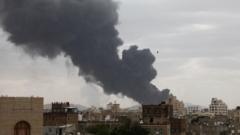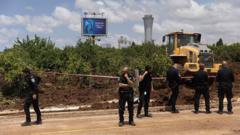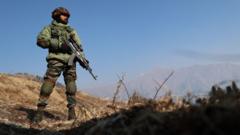Reports suggest a dangerous rise in hostilities following a deadly attack in Indian-administered Kashmir that has heightened military alert on both sides.
Explosions Shake Pakistani Kashmir Following India’s Retaliatory Threats

Explosions Shake Pakistani Kashmir Following India’s Retaliatory Threats
Tensions escalate between India and Pakistan as explosions are reported in Muzaffarabad amidst ongoing conflict over Kashmir.
Early Wednesday, residents in the capital of Pakistan-administered Kashmir, Muzaffarabad, reported hearing loud explosions, coinciding with newly heightened tensions between India and Pakistan. This escalation comes just two weeks after India declared it would retaliate for a terrorist incident that left over two dozen civilians dead in Kashmir.
The explosions reportedly targeted a rural site near Muzaffarabad, previously associated with the militant group, Lashkar-e-Taiba. Witnesses described the ominous sound of jets flying overhead prior to the blasts. This military activity is the latest chapter in a long-standing territorial dispute over Kashmir, a region claimed by both nuclear-armed nations.
The violence ignited on April 22, when militants attacked a group of tourists in the Indian-administered territory, resulting in 26 fatalities and numerous injuries. India quickly accused Pakistan of harboring those responsible, although the Pakistani government has denied any involvement, and evidence to substantiate India's claims remains scarce.
As a response, India commenced a series of punitive measures against Pakistan, including threats to disrupt critical water supplies flowing into its territory. Meanwhile, Indian forces have conducted a wide-ranging crackdown in Kashmir, arresting hundreds while searching for those behind the attack.
The situation has worsened, with both nations exchanging gunfire along the Line of Control in the days following the tragic incident. With both countries possessing substantial military capabilities, the threat of full-scale war looms ever larger, highlighting the precarious nature of peace in the region.
Anupreeta Das contributed to this report, alongside Mujib Mashal, the South Asia bureau chief for The Times.
The explosions reportedly targeted a rural site near Muzaffarabad, previously associated with the militant group, Lashkar-e-Taiba. Witnesses described the ominous sound of jets flying overhead prior to the blasts. This military activity is the latest chapter in a long-standing territorial dispute over Kashmir, a region claimed by both nuclear-armed nations.
The violence ignited on April 22, when militants attacked a group of tourists in the Indian-administered territory, resulting in 26 fatalities and numerous injuries. India quickly accused Pakistan of harboring those responsible, although the Pakistani government has denied any involvement, and evidence to substantiate India's claims remains scarce.
As a response, India commenced a series of punitive measures against Pakistan, including threats to disrupt critical water supplies flowing into its territory. Meanwhile, Indian forces have conducted a wide-ranging crackdown in Kashmir, arresting hundreds while searching for those behind the attack.
The situation has worsened, with both nations exchanging gunfire along the Line of Control in the days following the tragic incident. With both countries possessing substantial military capabilities, the threat of full-scale war looms ever larger, highlighting the precarious nature of peace in the region.
Anupreeta Das contributed to this report, alongside Mujib Mashal, the South Asia bureau chief for The Times.




















